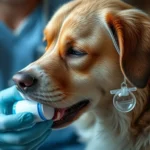
Introduction
Intervertebral Disc Disease (IVDD) is a condition that affects the spine and can lead to significant health issues in dogs, particularly in certain breeds like the French Bulldog. Understanding IVDD in French Bulldogs is crucial for dog owners, as early recognition and management can greatly improve the quality of life for these beloved pets. This article aims to inform and educate French Bulldog owners about IVDD, its symptoms, diagnosis, treatment options, and preventive measures. By the end, you’ll have actionable advice to help you manage your French Bulldog’s health effectively.
Understanding IVDD
What is IVDD?
Intervertebral Disc Disease (IVDD) is a degenerative condition that affects the discs between the vertebrae in the spine. These discs act as cushions, absorbing shock and allowing for flexibility in movement. When a disc herniates or ruptures, it can press on the spinal cord and nerves, causing pain, mobility issues, and even paralysis.
Causes of IVDD in French Bulldogs
French Bulldogs are particularly predisposed to IVDD due to their unique genetic and anatomical characteristics. Some of the primary causes include:
- Genetic predispositions: Certain breeds, including French Bulldogs, have a higher risk of developing IVDD due to inherited traits.
- Environmental factors: Actions such as jumping from heights or rough play can contribute to disc problems.
- Lifestyle factors: Weight and activity levels play a significant role. Overweight French Bulldogs are at an increased risk, as excess weight puts additional strain on their spine.
Symptoms of IVDD
Recognizing the symptoms of IVDD early can make a significant difference in treatment outcomes. Common signs to watch for in French Bulldogs include:
- Pain and discomfort: This may manifest as whining, reluctance to move, or sensitivity to touch, particularly around the back.
- Difficulty walking or standing: Your French Bulldog may exhibit wobbliness, dragging their paws, or struggling to get up.
- Changes in behavior and temperament: A normally playful dog may become withdrawn or irritable due to discomfort.
It’s essential to distinguish IVDD symptoms from other health issues, as many conditions can present similarly. If you notice any of these signs, consulting a veterinarian is crucial for an accurate diagnosis.
Diagnosis of IVDD
Veterinary Examination
When you take your French Bulldog to the vet for a suspected IVDD diagnosis, you can expect a thorough examination. The veterinarian will assess your dog’s mobility, reflexes, and neurological function. Key diagnostic tests may include:
- X-rays: These can help identify skeletal issues and rule out other conditions.
- MRI or CT scans: These advanced imaging techniques provide detailed views of the spinal cord and discs, allowing for a precise diagnosis.
Importance of Early Diagnosis
Timely intervention is crucial when dealing with IVDD. Early diagnosis allows for quicker treatment, which can alleviate pain and prevent further neurological damage. Conversely, delaying diagnosis may result in more severe complications, including permanent paralysis, making it all the more important for owners to recognize symptoms and seek veterinary help promptly.
Treatment Options for IVDD
Conservative Treatment
If your French Bulldog is diagnosed with IVDD, there are several non-surgical management strategies to consider:
- Rest and activity modification: Limiting movement is vital. Your vet may recommend strict crate rest for a specified period to allow healing.
- Medications: Pain relievers and anti-inflammatories can help manage discomfort and inflammation.
- Physical therapy and rehabilitation: Specialized exercises can help improve mobility and strengthen muscles surrounding the spine.
Surgical Treatment
In more severe cases of IVDD, surgery may be necessary to relieve pressure on the spinal cord. Surgical options include:
- Discectomy: This involves removing the herniated disc material to relieve nerve pressure.
- Spinal stabilization: This procedure may involve fusing affected vertebrae to provide stability.
It’s essential to discuss the potential risks and recovery expectations with your veterinarian to make an informed decision regarding surgery.
Preventing IVDD in French Bulldogs
Lifestyle Adjustments
Prevention is always better than treatment when it comes to IVDD. Here are some lifestyle adjustments to consider:
- Weight management: Maintaining a healthy weight is crucial. Consult your vet for a suitable diet and exercise plan.
- Regular exercise: Engaging in low-impact activities helps strengthen muscles and support spinal health. Avoid excessive jumping or running on hard surfaces to minimize injury risk.
Routine Veterinary Care
Regular veterinary check-ups play a vital role in early detection of health issues, including IVDD. Ensure your French Bulldog receives routine vaccinations and preventive care, and discuss any concerns with your vet.
Educational Resources for Owners
Knowledge is power. As a French Bulldog owner, consider exploring educational resources that focus on IVDD and overall canine health. Books, websites, and support groups can provide valuable insights and community support for managing your pet’s health.
Living with a French Bulldog with IVDD
Home Care Tips
If your French Bulldog is diagnosed with IVDD, creating a comfortable home environment is essential for their recovery. Here are some tips:
- Comfortable resting area: Provide a soft, supportive bed in a quiet space away from noise and activity.
- Mobility aids: Consider using ramps or harnesses to help your dog navigate stairs or jump in and out of vehicles without straining their back.
Support Systems for Owners
Caring for a dog with IVDD can be challenging. Finding community support can ease the journey. Online forums, local pet groups, and social media platforms can be excellent resources for connecting with other French Bulldog owners facing similar challenges.
FAQs about IVDD in French Bulldogs
What is the average age for French Bulldogs to develop IVDD?
While IVDD can occur at any age, it is most commonly diagnosed in middle-aged dogs, typically between 3 to 7 years old.
Can IVDD be cured?
While IVDD is manageable, it is not typically considered curable. Treatment aims to alleviate symptoms and improve quality of life.
How can I help my French Bulldog during recovery?
During recovery, ensure your dog follows their vet’s recommendations for rest, medication, and physical therapy. Monitor their progress and consult your veterinarian with any concerns.
Is surgery always necessary for IVDD?
Not all cases of IVDD require surgery. Many dogs respond well to conservative treatment. However, severe cases may necessitate surgical intervention.
How can I tell if my dog is in pain?
Signs of pain in dogs can include whimpering, panting, reluctance to move, and changes in eating or sleeping habits. If you suspect your dog is in pain, consult your veterinarian for guidance.
Conclusion
In summary, understanding IVDD in French Bulldogs is vital for ensuring the health and well-being of your furry friend. By recognizing the symptoms, seeking timely diagnosis, and exploring treatment options, you can manage this condition effectively. Remember, maintaining a proactive approach to your dog’s health, including routine veterinary care and lifestyle adjustments, is essential for prevention. Your partnership with your veterinarian is key to navigating the complexities of IVDD and ensuring your French Bulldog enjoys a happy, healthy life.









